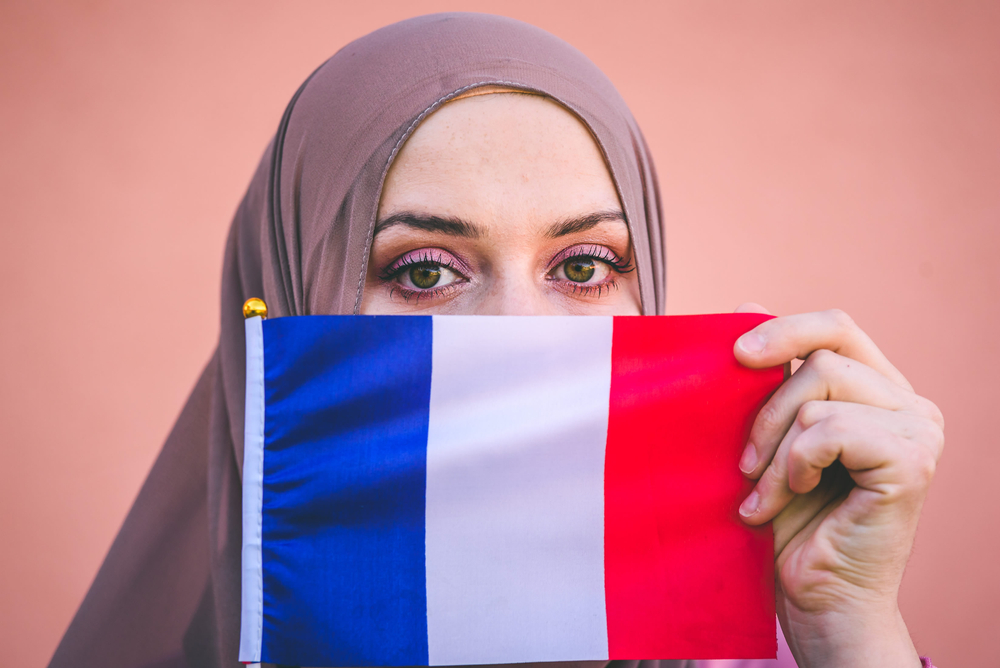Many defenders of Islam’s growing presence in the West say that moderate Islam needs to be promoted while “radical” Islam needs to be fought. However, one French journalist has now written a book, “At the heart of French Islam, Three years of infiltration in 70 mosques,” about his experience posing as a Muslim convert for three years and the various experiences he had with “moderate” imams. His book shows that even with these imams, which did not operate in any of the so-called radical mosques, that “the most brutal precepts of the Quran are transmitted literally but often with a smile.”
What does that mean in practice? For the journalist, Etienne Delarcher, he says these imams are clear that “theocracy remains the ideal regime.” His book has been published under a pseudonym for fear of reprisals, but he also recorded his conversations as evidence of his claims.
The views of these imams also have practical implications for how society would theoretically one day operate in France.
“I asked 15 religious leaders whether the hands of thieves should be cut off. Fourteen answered in the affirmative. Some are not enthusiastic, even uncomfortable, but, in the end, they advocate applying divine rule,” writes Delarcher.
Delarcher visited 70 different mosques over the course of three years.
“Deliberately, I did not target mosques identified as centers of radicalization,” he states.
Woman and Islam
In the first part of his book, Delarcher focuses on the role of women and Islam in French society, with the journalist stating that the imams partake in an “uninhibited festival of patriarchy.”
For example, one so-called moderate imam provided him “marital advice” in a recorded conversation. The imam said that if his wife is insubordinate and persistently fails to follow her husband’s “advice,” “then you must hit her… but not in the face, because you risk breaking her nose or put out an eye and you would be forced to pay,” he explained.
Delarcher has released a number of his recordings, with the subject anonymized, on his X profile. For example, in one video with a religious authority in the Grand Mosque of Villeurbanne, he explains that a wife does not have the right to refuse sex to her husband.
“The husband, he has needs in bed. That’s fine. As a woman, you’re not going to say no. If, today, there isn’t a reason, you are not menstruating, you don’t have anything at all, then you can’t say no. No, it’s about compulsory obedience. Why? Because it’s based on the duties and requirements of women,” says the imam.
Au cours de la discussion ce religieux de la Grande Mosquée de Villeurbanne m'explique qu'une femme n'a pas le droit de se refuser à son mari. pic.twitter.com/AWfV8OLoJ0
— Etienne Delarcher (@EDelarcher) June 6, 2024In another video, he shows a compilation of imams defending domestic violence in mosques. In one clip, the imam says:
“She cannot say she does not follow her husband. If she doesn’t want to, then he’s allowed to ‘appeal,’ in other words to hit them, to frighten them. It’s not to hurt them. You can hit them to frighten them, but you can’t break things or do anything that hurts them too much, it’s more of a threat in the sense that you don’t talk to each other anymore, but if it persists, the conflict persists, then… you take out the Siwak, or the little stick, there’s this little stick. It’s the little stick. So it’s a gesture of a threat.”
The imam refers to the Siwak, which in Arabic is referred to as a thin, flexible twig chewed on for dental hygiene, which can also be used to beat a woman.
Au cours de mon infiltration j'ai rencontré de nombreux religieux défendant les violences conjugales, y compris au sein de mosquées "modérées". pic.twitter.com/MxpxV05Fwm
— Etienne Delarcher (@EDelarcher) June 16, 2024Islam and France
The journalist said that what is striking is the difference between the often affable, smiling and friendly demeanor of religious authorities in the mosques and the message they deliver in private.
“It is never hate speech, except perhaps against homosexuality. It’s radicalism uttered kindly,” he writes.
Notably, these more controversial statements come about in private conversations and are not openly preached at sermons.
Public discourse is much more controlled because there is always the threat of expulsion,” he said. There can be, for instance, consequences for “anti-Republican” statements from imams, including monitoring from security services.
In terms of messaging, there is not so much difference between the radical Islamists and the “moderates” when they are spoken to in private, according to the journalist.
“We talk a lot about Salafism and Islamists, but the heart of the problem is that Islam is an unreformed religion. There has been no update (…) the Muslim Brotherhood, which is in the crosshairs, does not in fact have a more radical discourse than that which is current in so-called moderate mosques,” he writes in his book.
Critics of mass immigration to France often have pointed to the crime and disorder brought by many of the newcomers, particularly from Muslim lands. However, some say the greater threat is what role Islam could play in shaping France’s secular beliefs.
“Not a single one of my interlocutors defended secularism… they hope for the advent of a theocratic system. When one of the imams interviewed castigates the Islamic State in front of the ‘convert,’ he immediately recommends a ‘book from the Middle Ages which glorifies jihad and death as a martyr,” wrote Delarcher.
Delarcher denies his is Islamphobic
Delarcher refutes that he has an ideological bias or that there is any sort of Islamophobia behind his work, and says he tried to deliver his findings in the most objective and straightforward manner possible. He also says that he tries to avoid sensationalism in his book, instead delivering evidence.
He said that Islam is given a very superficial treatment by journalists in France, with Delarcher previously working as a broadcast journalist for a French television network. For instance, journalists will focus on the burkini for an inordinate amount of time, but do not provide any systematic insight into Islam, instead focusing on whatever sensationalist elements they can find to produce a news report.
French journalism offers a “very superficial treatment of Islam in the media, particularly the audiovisual media. It is handled by editorialists and not by field journalists. For example, we spent weeks on the burkini, even though it is an anecdotal, derisory phenomenon.”
Some mosques have already reacted to the book, with one located in Villeurbanne stating: “The Council of Mosques of the Rhône (CMR) solemnly contests that the authorized imams of the mosque could have made the remarks attributed to one of them,” reports the Saphir news site, which follows community news Muslim; however, the philosopher Faker Korchane, who is an expert on Islam in France, said he does not doubt the truth of the remarks in the book, which were often backed by audio recordings.
The investigation could raise questions about the role of moderate Islam across Europe. For instance, Muslim kindergartens are being opened up across Germany, many even sponsored by organizations known for extremist views. While these initiatives are celebrated due to “diversity and inclusion,” in the end, many of these institutions may be promoting a message vastly at odds with mainstream opinion in liberal countries like Germany, France and other Western countries when it comes to women’s rights and the rights of gay and lesbian people.






